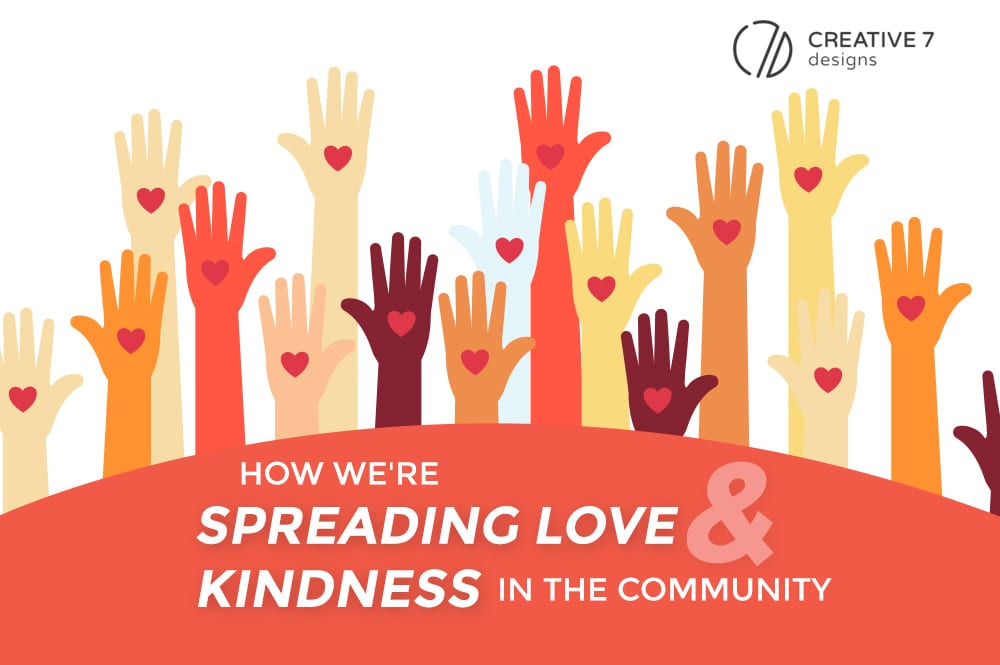 Don’t know how to spread love and kindness in your community? Don’t worry, in homage to the 2021 year, here are 21 things you can do that are easy, fun, and scientifically beneficial.
Don’t know how to spread love and kindness in your community? Don’t worry, in homage to the 2021 year, here are 21 things you can do that are easy, fun, and scientifically beneficial.
What’s the importance of sharing love and kindness, anyway? Aren’t people just going to take advantage of it to try to get themselves to the top … whatever that means? Not necessarily. Now, you might argue that kindness is more emotional than it is factual, and you want facts! Thankfully, we’ve found several science-backed ways being kind is good for your health. (Didn’t see that one coming, did ya’?)
Our world might not be comprised of individuals who are always adamant about doing the right thing all the time, but given last year’s struggle (we don’t need to go into details), being loving and kind is sort of necessary for everyone’s sanity.
Before we get into 21 awesome ways you can spread love this year, let’s learn how doing so can bring long-term benefits to you (and those around you).
The Science Behind Being Loving and Kind
Science shows that as children, we’re biologically wired to be kind and can further develop this trait despite outside influences and the stress of our day-to-day lives causing us to lose this inherent ability. Kindness and empathy help us relate to other people and have more positive relationships with friends, family, and even perfect strangers we encounter in our daily lives, but there’s more. What does science reveal?
Science Fact #1: Kindness releases feel-good hormones. Doing nice things for others boosts your serotonin, the neurotransmitter responsible for feelings of satisfaction and well-being. Like exercise, altruism also releases endorphins, a phenomenon known as a “helper’s high.”
Science Fact #2: Kindness is good for your heart. Being nice to others can affect the actual chemical balance of your heart. Kindness releases the hormone oxytocin. According to Dr. David Hamilton, “oxytocin causes the release of a chemical called nitric oxide in blood vessels, which dilates (expands) the blood vessels. This reduces blood pressure and therefore oxytocin is known as a ‘cardioprotective’ hormone because it protects the heart (by lowering blood pressure).”
Science Fact #3: Kindness eases anxiety and reduces stress. This is a big selling point. It’s like if you’re not stressed these days, are you really normal? “Social anxiety is associated with low positive affect (PA), a factor that can significantly affect psychological well-being and adaptive functioning,” points out the University of British Columbia (UBC) on a study on happiness. The researchers at UBC found that participants who engaged in kind acts displayed significant increases in PA that were sustained over the four weeks of the study. As for the stress, according to a study on the effects of prosocial behavior on stress, “affiliative behavior may be an important component of coping with stress and indicate that engaging in prosocial behavior (action intended to help others) might be an effective strategy for reducing the impact of stress on emotional functioning.”
21 Things You Can Do to Spread Love and Kindness this Year
Check on your family and friends. Whether via text message, video chat, email, or phone call, doing this can help boost moods and make people feel loved.
Support local businesses. Everyone is dealing with uncertainty, and that especially includes small businesses such as mom-and-pop shops in your community. Even if you can’t purchase anything, there are other ways to support small businesses, such as sharing on social media, posting a review, or recommending it to friends and family.
Let go of grudges and forgive. You. Will. Be. Happier. And so will they. Trust this.
Volunteer your time. The pandemic might be tricky to navigate, but this is doable especially with the extra free time at home; use it to help the community whether it is volunteering at a locale food shelter, cleaning up the neighborhood clean up, or something else. All-volunteer work is essential and valuable to our community.
Remembering the little things. Smile when passing someone on the street. Hold the door open. Give up your seat. Say thank you. These are small gestures of kindness but they’re almost effortless and can really make someone’s day 100% better!
Pay it forward. Whether it be the drive-thru, your local coffee shop, or even at the grocery store, merely paying for the person behind you may set off a chain reaction of community acts of kindness.
Donate socks to a homeless shelter. Did you know that socks are the most needed item at shelters? Purchase socially conscious socks or stock up on your next big box retailer order and drop off at your nearest shelter. We promise that this small act of kindness will go a very long way.
Turn your phone off and be present when spending time with others. In a world driven by technology, it’s nice to be present with the people you’re with.
Listen more than you talk. This could tie in with the point above, but active listening is power, especially in a world where everyone seems to want to be heard. There are a lot of people out there who are used to just sitting there waiting to speak, For once, let them talk.
Ask someone if they need help. For some reason, society has bred people to be afraid of reaching out for support. You don’t have to be some sort of self-reliant superhero who can carry the weight on your shoulders. If you have even the slightest suspicion that someone may be feeling down or is struggling, just ask for help.
Say kind things about people behind their backs. Why backstab when you could backsoothe? #backsoothe
Give someone a book you think they’d like. We have downtime, and downtime could quickly transform into literal down time where your free time is making you feel down. Why not read a book (or give a book). Reading is an easy way to take your mind away from what’s going on (or not going on).
Tell someone you love them and even better, the reasons why. Sound like something way out of your comfort zone? Maybe, but it’s about doing good, not necessarily being comfortable.
Be kind to the earth. Do whatever you can to reduce your carbon footprint. (Walk or ride the bus instead of drive, recycle, compost, use less plastic, plant a tree, etc.)
Feed someone else’s parking meter if their time is about to expire.
Make uplifting and inspiring posts on social media. Some people are stuck at home with nothing but social media. Brighten their day.
Clean up after yourself and others sharing your space without being asked.
Let someone in a hurry cut you in line at the store.
Reconnect with someone who changed your life in positive ways, even if it’s years later. Whether it’s a relative, friend, teacher, counselor, or coach. If they positively impacted you and it still means something, remind them.
Give a parent some much-needed free time. Take the kids to a movie or playground to give the parent a break for a few hours.
And last, but not least, be kind to yourself. To quote Pema Chodron: “Be kinder to yourself and then let your kindness flood the world.” So give yourself a compliment every day, take time to meditate, exercise, take relaxing baths or do whatever makes your soul happy.
SOURCES:
https://www.quietrev.com/6-science-backed-ways-being-kind-is-good-for-your-health/
https://www.365dots.com/7-ways-to-spread-kindness-throughout-your-community
https://www.luckyduckfoundation.org/news/news-community-acts-of-kindness/
https://www.selfstairway.com/spread-happiness/
https://arisesociety.com/blogs/arise-society-blog/ways-to-be-kind-and-spread-love-in-the-world
https://www.searchenginejournal.com/27-easy-ways-to-spread-kindness-within-your-community-industry/301381/#close
https://janebluestein.com/2019/spread-love-on-random-acts-of-kindness-day-every-other-day-too/


